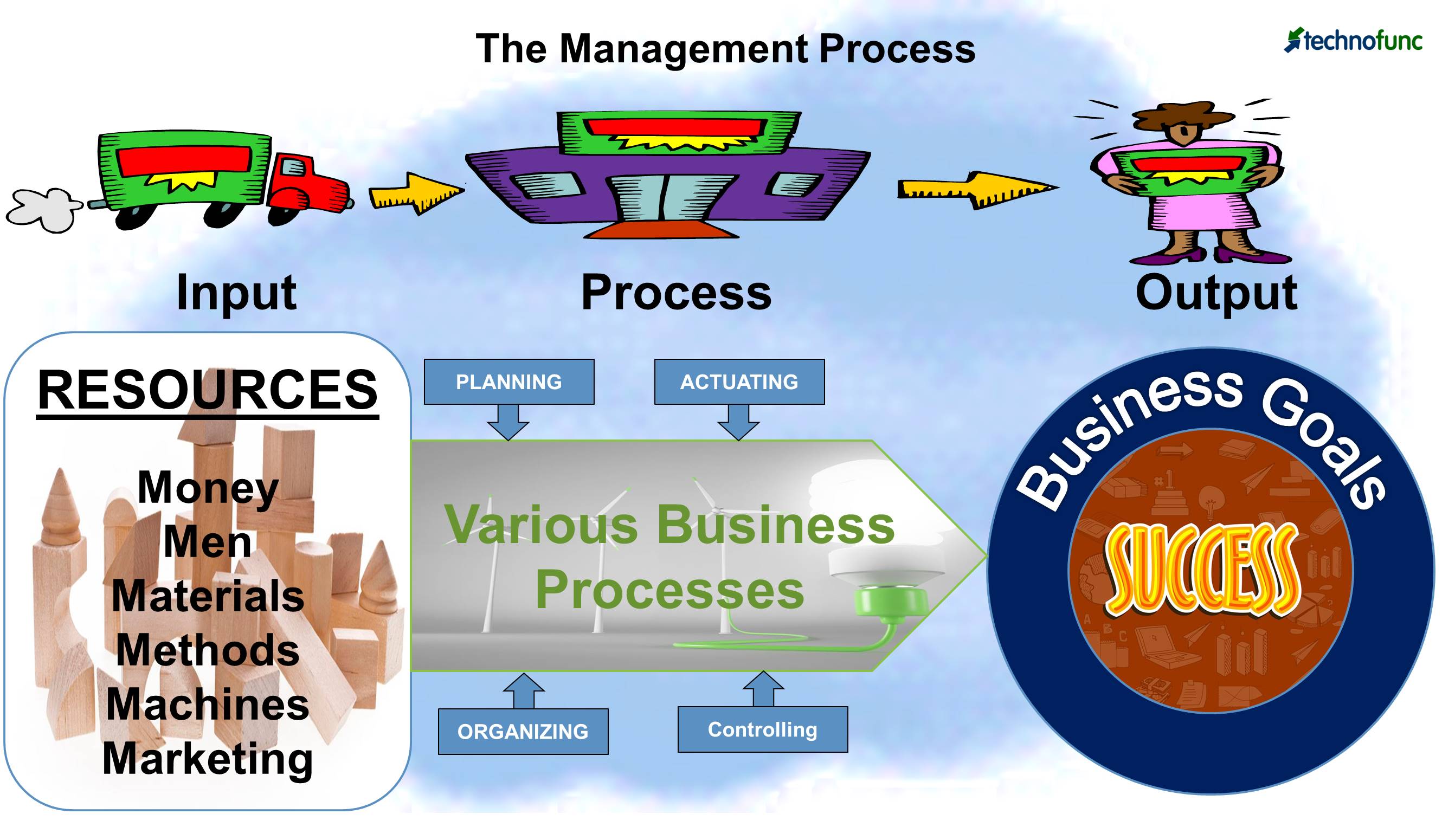- Home
- Business Processes
- Industry Knowledge
- Aerospace Industry
- Automotive Industry
- Banking Domain
- BFSI Industry
- Consumer/ FMCG Industry
- Chemicals Industry
- Engineering & Construction
- Energy Industry
- Education Domain
- Finance Domain
- Hospitality Domain
- Healthcare Industry
- Insurance Domain
- Retail Industry
- Travel and Tourism Domain
- Telecom Industry
- Leadership Skills
- eLearning
- Home
- Leadership Skills
- Leadership & Management
- Concept of Management
Concept of Management
The concept of management refers to the process of planning, organizing, staffing, directing, coordinating, and controlling to achieve organizational goals. It is the management of human, physical, financial, and other valuable resources of the organization in an effective and efficient manner to achieve business objectives.
Different people have conceived and defined management in different ways. But, the essence of management lies in determining worthwhile goals and then carefully selecting and utilizing resources through efficient and effective planning, organizing, actuating, and controlling to achieve those goals.
Who is a Manager?
You are a manager. What does this mean? The word derives from the ancient French word for handling horses and a later one for handling the affairs of the kitchen. Cynics might replace horses with donkey, but all would see the analogy of keeping an organization alive through the activities of the kitchen. Probably the one that is most simple, popular, and often quoted by many in general is "getting things done through other people."
Let us now look at different definitions that highlight important aspects of management.
- Management is a distinct process consisting of activities of planning, organizing, actuating and controlling, performed to determine and to accomplish stated objectives with the use of human beings and other resources (Martin, 1977).
- Good management is merely the exercise of common sense and the Golden Rule (Daniel, 1976)
- The six M’s (money, men, materials, methods, machines, and marketing) of management or the basic resources, as they are often called, are subjected to the fundamental functions of management - planning, organizing, actuating, and controlling -to achieve stated objectives.
- Management is an art struggling to become a science.
- Management science is a body of systematized knowledge accumulated and accepted with reference to the understanding of general truths concerning management.
- The art of management is a personal creative power plus skill in performance. The contemplation of problems, events, and possibilities develops personal creative power, while experience, observation, and study of results contribute to skilled performance. It other words, management art involves envisioning an orderly whole from chaotic parts, communicating the vision, and achieving the goal. It is the "art of arts" because it organizes and uses human talent (Boehringer, 1975)

From these definitions, we can infer that the principles and the techniques of management are not only applicable to the business world but they can be equally applied universally. They also find application in social, religious, charitable, and non-profit organizational contexts.
Essentially we can conclude that management is the integration of human and other resources in a manner that leads to effective utilization and harmonization of the individual efforts with organizational goals.
Suggested Reading and Resources
Related Links
You May Also Like
-
Behavioral Approach to Management
The behavioral management theory had a profound influence on management by focusing on understanding the human dimensions of work. It is also called human relations movement as behavioral theorists focused on managing productivity by understanding factors of worker motivation like their needs and expectations, personality, attitudes, values, group behavior, conflict, and group dynamics. It advocated the use of psychological techniques to motivate employees.
-
Managers have to perform many roles in an organization, and how they handle various situations will depend on their style of management. Management styles are the characteristic ways, of making decisions relating to subordinates. These are the strategies, efforts, or direction used by the manager, to create an efficient workplace, to achieve organizational goals. A management style is the method of leadership used by a manager.
-
The concept of management refers to the process of planning, organizing, staffing, directing, coordinating, and controlling to achieve organizational goals. It is the management of human, physical, financial, and other valuable resources of the organization in an effective and efficient manner to achieve business objectives.
-
What are the functions which a leader does to establish as a leader? What are the activities undertaken by them to become great leaders, rather revolutionary leaders? The most important tasks done by a leader in all situations are defining the vision, mission, and goals, leading the team, administrative functions, motivating followers, decision making and conflict resolution, and continuous development.
-
Frederick Winslow Taylor started the “Scientific Management Movement”, and attempted to study the work process scientifically. Scientific management, also called Taylorism, was a theory of management that analyzed and synthesized workflows. It is a system for increasing the efficiency of manpower to its maximum potential and streamlining production to improve efficiency. This article explores this theory in more detail.
-
Many different types of teams have been identified by social scientists. Managers may encounter the diverse types of challenges while managing different kinds of teams. Challenges associated with Cross-Functional Teams might be different from that of a Geographically Dispersed Team or a Virtual Team. This article explores some common categories and subtypes of teams.
-
Management Principles by Fayol
Henri Fayol (1849-1925), a French industrialist and a prominent European management theorist, developed a general theory of management. Fayol outlined the fourteen principles of management.
-
There are four characteristics of leadership that help us to understand the character of leadership as a concept. 1. Leadership is a process, 2. Leadership involves influence, 3. Leadership always occurs in a group context and 4. Leadership involves goal attainment. These are the four components that make up the character of the 'leadership' term and help us to define the leadership concept. All of these components of leadership have common characteristics.
-
The ten most important qualities that define a good leader are self-awareness, interpersonal and communication skills, ethical values, organizational consciousness, self-confidence, adaptability and flexibility, imagination and creativity, focus & result-orientation, continuous self-development and accountability and ownership for his actions. These ten qualities of leadership every good leader should possess to a certain extent and must continually strive to develop them.
-
The best career choices are ones that match your values. Each person has several values that are important to him. These values are highly personal and knowing them provides a clearer sense of what's most important to you in your life and career. Career values are the beliefs you consider important from a work standpoint. Values help you understand what you want from a job? Explore a few examples of work values that can influence career path and job satisfaction.
Explore Our Free Training Articles or
Sign Up to Start With Our eLearning Courses

About Us
Learning
© 2023 TechnoFunc, All Rights Reserved










